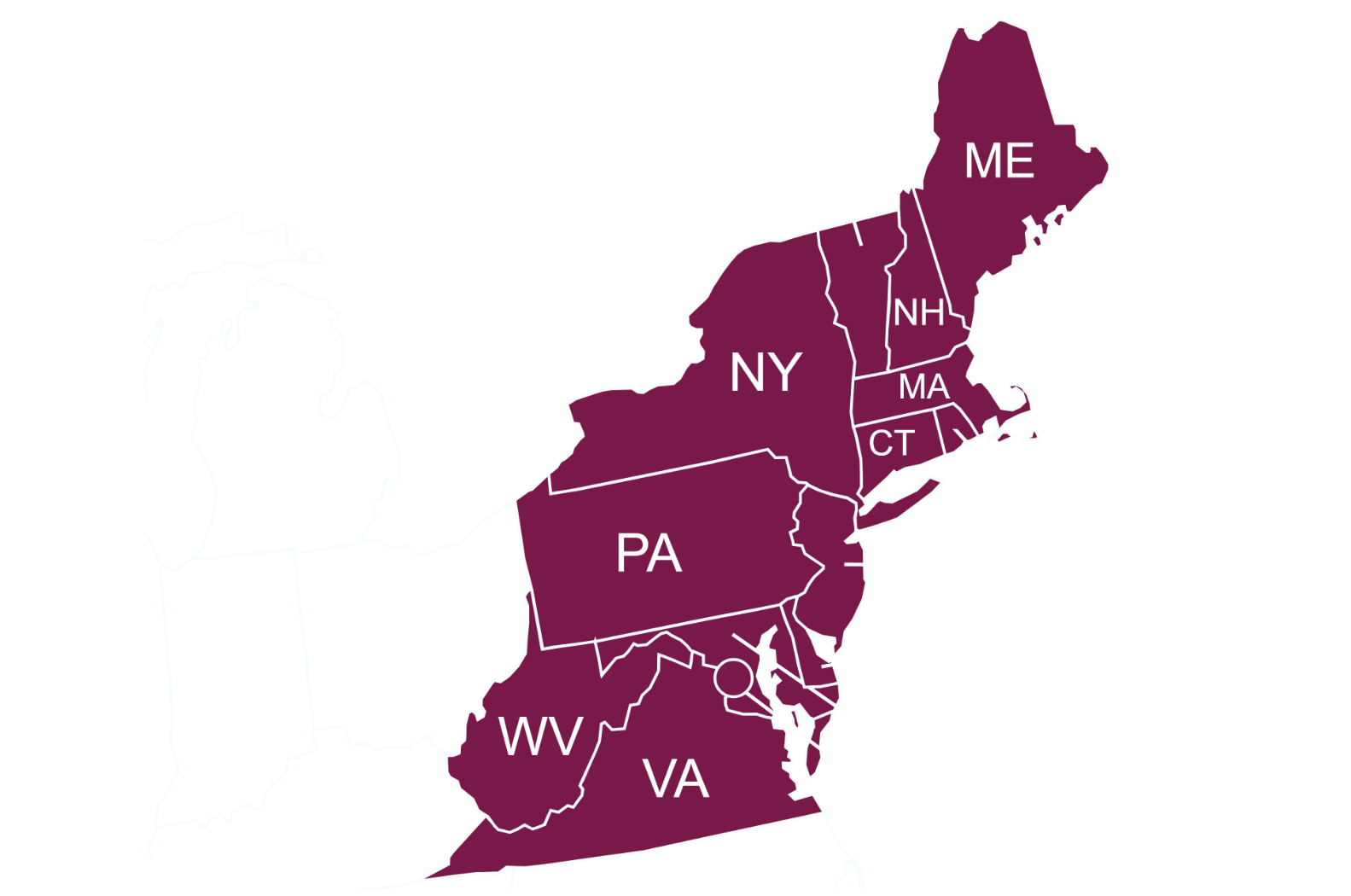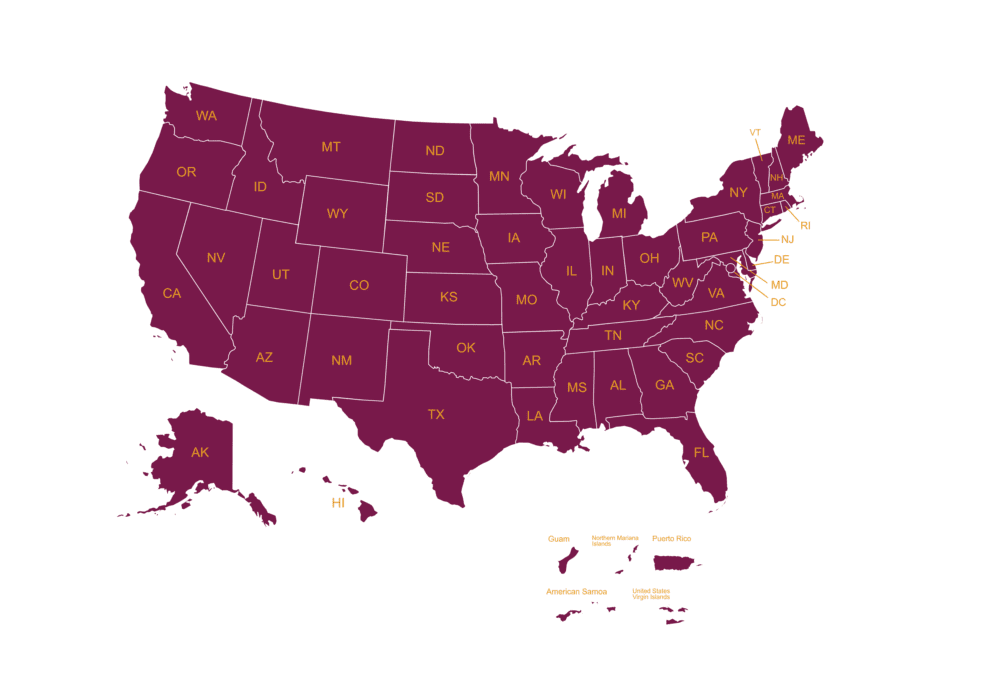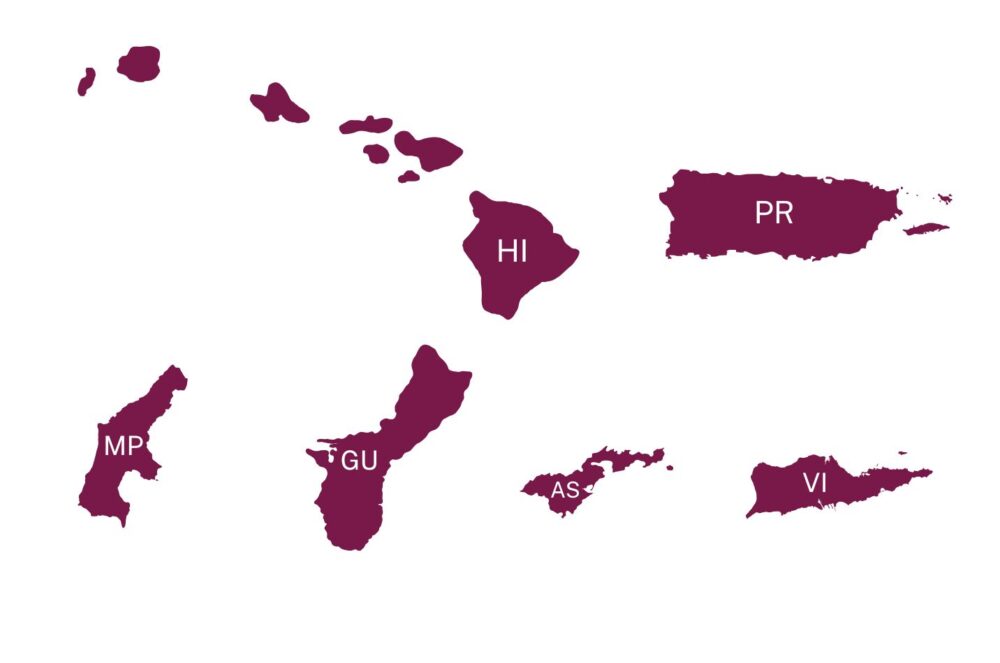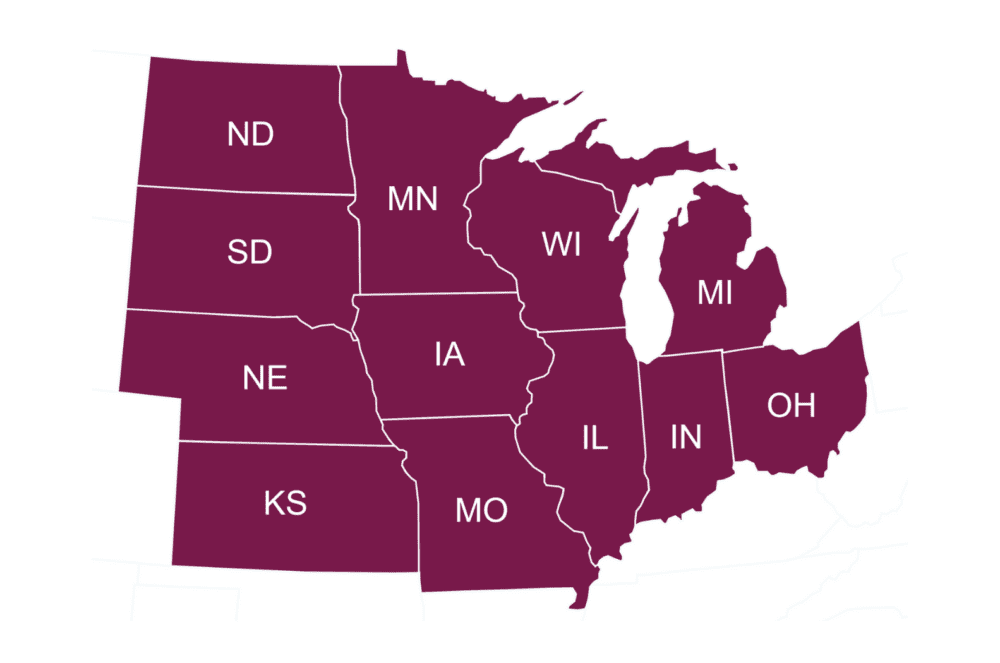Jump to Your State: Connecticut | Delaware | District of Columbia | New Jersey | Maryland | Maine | New Hampshire | Pennsylvania | Rhode Island | Vermont | Virginia | West Virginia
On Monday, March 31, the Federation of State Humanities Councils learned that DOGE (Department of Government Efficiency) is targeting the National Endowment for the Humanities (NEH) with the aim of substantially reducing its staff, cutting the agency’s grant programs, and rescinding grants that have already been awarded. The National Endowment for the Humanities is the only federal agency that funds our nation’s 56 state and jurisdictional humanities councils.
Starting late in the evening on Wednesday, April 2, all humanities councils received emails and letters under the signature of NEH Acting Chair Michael McDonald notifying them that all awarded grants—including their 5-year General Operating Grants and other program-specific awards—were canceled in their entirety, effective April 1.
We asked humanities councils around the country to share what their state will lose if these cuts go through. Here’s how states in New England and the Mid-Atlantic region will be negatively impacted by the loss of National Endowment for the Humanities funds and defunding of their state humanities council. While not every state contributed to this article, every state in the country will be affected.
What will be lost in Connecticut if NEH funding for humanities councils is cut?
Founded in 1934, the nonprofit CT Humanities is the official humanities council of Connecticut. It is funded through the National Endowment for the Humanities. In testimony to the Connecticut General Assembly on April 3 (shared on the CT Humanities’ website), Executive Director Jason Mancini shared what Connecticut will lose if CT Humanities’ federal funding is cut.
“We stand to lose more than just funding. Cultural investment through arts and humanities in Connecticut makes our state an extraordinary place to live and work, and a place that a growing number of people want to visit. While arts and humanities may feel to some like abstractions—nice but not necessary—they are not. Through arts and humanities, we seed the ground for curiosity, knowledge, and understanding – innovation and the critical thinking skills needed for confronting life’s challenges and opportunities; we provide spaces and places that our residents learn about each other and the world we all share; through arts and humanities, people express themselves, experience others—all key in social/emotional learning and development and combatting societal concerns such as the loneliness epidemic. All the problems, the pain, and suffering we confront; the love, joy, and connection we hope to feel are rooted in and expressed through arts and humanities. While it’s tempting to ascribe a dollar amount to all of this, we should recognize arts and humanities for what they truly are…invaluable.
We bring people together, we help make sense of the world around us, and, in times like these, we are the light in the darkness and the wellspring of wisdom that will guide us through.”
Read CT Humanities’ full statement on the cuts here.
Read more coverage of these cuts’ impact in Connecticut: Fox 61, Darien Times
What will be lost in Delaware if NEH funding for humanities councils is cut?
Founded in 1973, the nonprofit Delaware Humanities is the official humanities council of Delaware. It is funded through the National Endowment for the Humanities. In a statement on their website, the Delaware Humanities team shared what Delaware will lose if Delaware Humanities’ federal funding is cut.
“Delaware Humanities, along with our partners, grantees, and the communities we support throughout all three counties in Delaware, will be greatly impacted by these cuts…
Delaware Humanities will be forced to significantly scale back or suspend programs and grants. Delaware-based nonprofits will lose critical access to grants for projects that serve libraries, museums, educational institutions, and local communities throughout the state.
Our Speakers Program, which provides over 100 public talks and classroom presentations per year on history, culture, literature, ethics, the environment, and everything in between, will be disrupted—effectively preventing communities from access to free learning opportunities
Prime Time Family Reading, which builds strong foundations for children’s literacy and family bonding through literature, may be suspended— impacting local libraries and the families and children that regularly attend
Community Conversations, which provides discussions to help build strong relationships within organizations and among communities across different backgrounds, may be suspended— affecting local communities and hindering opportunities for connection.
As we navigate these abrupt changes, we are evaluating the next steps on how to best support our partners. We will remain steadfast in our mission to strengthen our communities by connecting Delawareans through the diversity of human experiences.”
Read Delaware Humanities’ full statement on the cuts here.
What will be lost in the District of Columbia if NEH funding for humanities councils is cut?
Founded in 1980, the nonprofit HumanitiesDC is the official nonprofit of the District of Columbia. It is funded through the National Endowment for the Humanities. In a statement on their website, HumanitiesDC shared what DC will lose if HumanitiesDC’s federal funding is cut.
“Thousands of DC residents will be impacted by this loss because of the effects on:
- Important community gatherings, like the DC History Conference and the DC/DOX
Documentary Film Festival; - Free, vital cultural services and programming shared regularly across the city, and;
- Critical support and funding for the over 100 grantees and independent humanities
practitioners responsible for the city’s festivals, documentaries, historical research, local museums and cultural activities.
Our libraries, archives, arts centers, historical associations—the foundations that help us create, celebrate, and learn from our city’s rich heritage, and in turn help build civic engagement— are all simultaneously under siege.”
What will be lost in New Jersey if NEH funding for humanities councils is cut?
Founded in 1972, the New Jersey Council for the Humanities is a nonprofit and the official humanities council of New Jersey. It is funded through the National Endowment for the Humanities. Executive Director Carin Berkowitz shared what New Jersey will lose if the New Jersey Council for the Humanities’ federal funding is cut.
“The New Jersey Council for the Humanities works efficiently and economically to deliver public humanities programs to all New Jerseyans, empowering individuals with critical skills for self-sufficiency and career development, and enhancing communities by fostering civic pride and cultural tourism. “
In a statement on their website, NJCH shared more about what will be lost if they are defunded:
“NJCH will suffer directly, as will its partners, grantees, and communities of New Jerseyans who look to the humanities for connection and perspective. The impacts will be swift and severe:
NJCH will be forced to significantly scale back or cut grants, programs, and operations. New Jersey-based cultural organizations will lose access to critical first grants for projects just getting underway, grants that often act as a springboard to larger foundation or federal funding.
Interdisciplinary humanities programs for veterans, which create pathways to healing AND to higher education, will be imperiled. Literacy programs that teach whole families to read, give them books, and provide them meals while learning may be shuttered.
Community history programs empowering small organizations and municipalities to collect and share their local histories in conjunction with the 250th anniversary of our country’s founding will be disrupted or discontinued.
Cultural nonprofits make meaning of our histories and our heritage, create bridges between cultures, and enliven our communities. They also contribute significantly to our state and local economies. Destroying a primary source of their funding will make New Jersey poorer, culturally and economically.”
Read the NJCH’s full statement on the cuts here.
What will be lost in Maryland if NEH funding for humanities councils is cut?
Founded in 1973, the nonprofit Maryland Humanities is the official humanities council of Maryland. It is funded through the National Endowment for the Humanities. CEO Lindsey Baker shared what Maryland will lose if Maryland Humanities’ federal funding is cut.
“NEH funding covers our operating expenses and salaries, enabling us to advance Maryland Humanities’ mission of helping communities share their stories through diverse programming. Our initiatives include:
Maryland History Day (MHD): In 2024, 28,845 students and 500 educators participated in this program, which sparks critical thinking and helps students develop skills in historical research and analysis, writing, and public speaking. One Maryland One Book (OMOB): Our flagship literacy initiative and the state’s only statewide community reading program. Museum on Main Street (MoMS): Bringing high-quality traveling exhibits to small-town cultural venues statewide. Veterans Book Groups: Creating supportive environments for veterans to discuss military experiences and civilian transition. Regional Humanities Networks (RHN): Providing collaboration space for humanities partners to share resources and supporting communities through capacity-building and technical assistance. Marilyn Hatza Memorial SHINE Grant Program: Supporting nonprofits conducting humanities work throughout Maryland. We have distributed $2.35 million in general operating support to small nonprofit organizations across all 23 counties and Baltimore City within just three years.
Together, these programs enrich Marylanders’ lives and strengthen our state’s cultural fabric. Without NEH funding, Maryland Humanities would be unable to provide these vital initiatives. Federal funding supports Maryland Humanities’ work across the state, including capacity building, community outreach, and community initiatives. This funding allows us to invest in communities by fostering educational development for younger generations while preserving and elevating both well-known and hidden Maryland stories.”
What will be lost in Maine if NEH funding for humanities councils is cut?
Founded in 1976, Maine Humanities is a nonprofit and the official humanities council of Maine. It is funded through the National Endowment for the Humanities. Executive Director Samaa Abdurraqib shared what Maine will lose if Maine Humanities’ federal funding is cut.
“More than 57,000 people in Maine were served by Maine Humanities’ work [last year]—either through direct programming or the programs of our grantees. Our work had impacts in all 16 counties.
Losing NEH funding would present risks to the following: Grants staff to manage our grants program. Coordination of National History Day [in Maine]. Support for Civil Rights Teams advisors (Maine is the only state with a statewide Civil Rights Team Project). Community text-based discussion programs. Work with the Department of Corrections (training residents to be facilitators and to facilitate text-based discussion programs inside DOC facilities). Our Maine Speaks program provides Maine-based speakers to organizations and communities all over Maine. Our newly developed Community History program allows communities to interact on a personal and collective level with local histories through storytelling and archival work.
Federal funding allows our reach to be statewide: Maine is a large state, and our staff is small. Federal funds allow us to travel to different parts of the state to spend time with partners and with grantees. These funds allow us to spend time in different communities to gather a better understanding of their needs and desires for their community’s culture.
Federal funding supports our overall operations. It pays for our staff salaries, the maintenance of our building and associated costs with occupying the building, and all of our administrative costs. Federal funding also supports our primary programs: We can often get foundation dollars to support some of our specialized programs, but Federal funds support our ‘bread and butter’ text-based discussion programs and our speakers’ bureau programs.”
Read Maine Humanities’ full statement on the cuts here.
Read more coverage of these cuts’ impact on Maine: Maine Public
What will be lost in New Hampshire if NEH funding for humanities councils is cut?
Founded in 1974, the nonprofit New Hampshire Humanities is the official humanities council of New Hampshire. It is funded through the National Endowment for the Humanities. Executive Director Michael Haley Goldman shared what New Hampshire will lose if New Hampshire Humanities’ federal funding is cut.
“New Hampshire Humanities supports a fragile network of cultural and community institutions in a state where budgetary crisis already limits the resources for many of these critical organizations. Already, New Hampshire Humanities has seen a spike in applications and requests for support from large and small institutions as they seek to serve their towns and communities. The loss of NEH funding reduces the ability for these community hubs to bring together their residents in dialogue through New Hampshire Humanities’ grants, programs, and resources.
As one recent grant recipient reported: ‘[T]here’s the crucial matter of the importance of the humanities in public life. People may not be able to articulate precisely what’s important about the kinds of conversations we convened [at our events], but they show up.’ Through NEH funding, New Hampshire Humanities helps build the healthy communities that are the heart of the Granite State.
New Hampshire Humanities builds our programming around federal funding provided by the National Endowment for the Humanities, relying on this secure source for operational costs so that our matching, privately raised funding can be directly applied to our programming costs. Much of our private funding, particularly funds raised from grants and sponsorships, cannot be used for the day-to-day expenses of the organization.
New Hampshire Humanities’ adult literacy program, Connections, demonstrates this public/private partnership. With staff costs paid for by the NEH, sponsor support can go directly to providing reading experiences with partners such as Adult Education Center and addiction recovery programs.
Through NEH funding, New Hampshire Humanities programming reached 174 of New Hampshire’s 234 municipalities last year, reaching deep into the rural areas of the state as well as the larger cities. Without this operational support, our programs would reach a tiny fraction of the Granite State.”
What will be lost in Pennsylvania if NEH funding for humanities councils is cut?
Founded in 1973, the nonprofit PA Humanities is the official humanities council of Pennsylvania. It is funded through the National Endowment for the Humanities. Executive Director Laurie Zierer shared what Pennsylvania will lose if PA Humanities’ federal funding is cut.
“If NEH funding goes away, PA Humanities and the people we serve will face profound losses. Our ability to offer transformational, community-driven programs across Pennsylvania would be drastically reduced. PA Humanities brings a unique, participatory approach to the humanities and research, one that centers innovation and building networks of care and collaboration. Without federal support, that vital connective work—the kind that strengthens communities and illuminates what’s possible—would be at serious risk.
Importantly, the work of our core programs and special projects would be at risk. This includes:
250th Anniversary of the Declaration of Independence: Work with libraries and community organizations across the state to support locally driven programs that celebrate our shared history and explore the meaning of democracy today.
PA Heart & Soul: A resident-led story gathering initiative that works to find common ground, build bridges through conversations, and get people more involved in actionably planning for their future with local government.
Voices of History: A first-of-its-kind statewide effort to collect and celebrate the stories, family histories, struggles, and triumphs of Black Pennsylvanians in the 20th and 21st centuries.
Rain Poetry: A creative program that teaches children to write haiku with local poets and brings their words to life in public spaces with rain-activated paint.
Youth-Led Humanities: Community-based support network for better engaging young people with the humanities to develop leadership skills and promote civic engagement.
In addition to these programs, PA Humanities’ research, which is recognized as a state and national model, would be under threat without federal support. Through initiatives like the PA Humanities Discovery Project and PA CultureCheck, we’ve collected data and listened to voices from every corner of the state, offering insights into needs and trends, supporting informed decision-making, strengthening local partnerships, and ensuring the cultural sector remains a vital part of community life.
Federal funding is the cornerstone of our work at PA Humanities. It provides not just program dollars, but stability, credibility, and leverage—the kind of sustained support that makes long-term community investment and transformation possible.
In a state as vast and diverse as Pennsylvania, the humanities are a powerful tool for connection and growth. Public funding is what ensures this work reaches everyone. As a result, our work touches people in every congressional district.
NEH funding allows us to put national resources into local hands, supporting under-resourced organizations and providing the scaffolding for innovative, place-based work that meets people where they are. It also enables us to forge lasting partnerships among museums, schools, libraries, civic groups, cultural organizations, local leaders, humanities practitioners, and community volunteers—creating a statewide network rooted in shared purpose and connection.
Moreover, federal investment fuels credibility and trust. It signals that our work matters, not just in Pennsylvania, but as part of a national commitment to democratic values, community building, and cultural preservation. It is the foundation of every grant we award, every partnership we make, every story we help tell, and every opportunity we create for people to see themselves reflected in the story of this state and country.”
Read PA Humanities’ full statement on the cuts here.
Read more coverage of the impact these cuts will have on Pennsylvania: Philadelphia Enquirer, Daily Pennsylvanian
What will be lost in Rhode Island if NEH funding for humanities councils is cut?
Founded in 1973, the nonprofit Rhode Island Humanities is the official humanities council of Rhode Island. It is funded through the National Endowment for the Humanities. Executive Director Elizabeth Francis shared what Rhode Island will lose if Rhode Island Humanities’ federal funding is cut.
“[If federal funding is cut, we’ll lose our] Providence Clemente Veterans Initiative, described as ‘life saving’ by many veteran graduates; cultural heritage programs that preserve and tell Rhode Island’s stories. [We’d also have to cut our] youth writing and civic education programs such as Write Rhode Island, Manton Avenue Project, and Generation Citizen. These programs prepare students for educational and job success as well as to become active, responsible citizens.
Rhode Island Humanities is the only dedicated source of funding for humanities for the public in the state. Federal funding is critical to ensure that Rhode Islanders from all backgrounds, neighborhoods, and financial situations have access to history, cultural engagement, and civic education. Federal funding also leverages significant sources of funding from foundations, the state government, and individuals; it is an engine for local economies and for tourism. Federal funding is critical to the success of 250th commemorations and to residents and visitors learning about the vital history of the American Revolution.”
What will be lost in Vermont if NEH funding for humanities councils is cut?
Founded in 1974, the nonprofit Vermont Humanities is the official humanities council of Vermont. It is funded through the National Endowment for the Humanities. Executive Director Christopher Kaufman Ilstrup shared what Vermont will lose if Vermont Humanities’ federal funding is cut.
“Vermont Humanities works with dozens of community partners in all 14 counties of our ‘Brave Little State,’ and a loss of federal funding would mean deep reductions in life-changing programming for the littlest Vermonters in our early literacy programming, for middle-school students in our Summer Humanities Camps and for humanists on all ages in our Veterans programs, Literature and Medicine groups, trainings for teachers and librarians, and in grassroots grantmaking across the state.
Public programming that brings Vermonters together through the humanities to organize around important issues in their communities—like housing, health care, food security, and recovery from addiction—would be diminished or lost. The work of humanists to promote democracy and civic health would be far less visible.
Federal Funding supports dozens of humanists working in over 100 communities each year in Vermont. Each dollar of federal funding is matched by $1.50 of private or state funding to increase our impact in one of America’s most rural places. With the second smallest population of any state in the country, Vermont simply doesn’t have the resources to replace federal funding for the Humanities or indeed in any of the other myriad cuts across the federal government.”
Read Vermont Humanities’ full statement on the cuts here.
Read more coverage of these cuts’ impact on Vermont: Vermont Public, Vermont Public (2), Rutland Herald, Seven Days
What will be lost in West Virginia if NEH funding for humanities councils is cut?
Founded in 1974, the West Virginia Humanities Council is a nonprofit and the official humanities council of West Virginia. It is funded through the National Endowment for the Humanities. In an op-ed published on The Real WV, Executive Director Eric Waggoner shared what West Virginia will lose if the West Virginia Humanities Council’s federal funding is cut.
“[These] devastating funding cuts [put] West Virginia’s rich history, cultural tourism, and community programs at immediate risk. These cuts will pull nearly a million dollars per year in Congressionally approved federal funding out of West Virginia, directly affecting historical societies, museums, festivals, and organizations that work tirelessly to preserve and share the enthralling story of our Mountain State.
In our role as the NEH’s official state affiliate, the West Virginia Humanities Council, a nonpartisan nonprofit organization, has delivered NEH funding throughout West Virginia since 1974, providing programs and giving grants to organizations and initiatives that celebrate our cultural heritage. These efforts ensure that West Virginia’s history and culture remain alive and accessible for future generations.
Our grants and programs can be found in all 55 counties, everywhere from cities to the smallest communities. We have supported initiatives as wide-ranging as Arthurdale Heritage in Preston County and the Contemporary American Theater Festival in Shepherdstown. Our West Virginia National Cemeteries Project and the History Alive! speaker series are just two examples of how we bring state, national, and military history to life and create invaluable experiences for students, residents, and visitors alike.
Along with important programs like these, our support for West Virginia studies and civics programs has made the West Virginia Humanities Council a national leader in the arts and humanities for people of all ages.
Kenzie New Walker, executive director of Matewan’s West Virginia Mine Wars Museum, attests that Council grants ‘have enabled us to create new permanent exhibits, support Appalachian authors, and launch innovative programs—many of which continue to thrive well beyond their initial funding. The success of the Museum over the past decade is, in large part, thanks to invaluable partners like the West Virginia Humanities Council.’
But our work is about more than just preserving history—it’s also about contributing to a thriving cultural economy by fueling our state’s businesses and tourism industry. We coordinate with in-state businesses, corporations, foundations, and cultural organizations to create productive, sustainable partnerships between the public and private sectors that benefit us all.
The West Virginia Humanities Council is federal funding done right—locally directed and locally delivered, with transparency and accountability to the people of West Virginia. West Virginia’s Congressional representatives know the impact of our work, and have demonstrated their support year after year through regular appropriations. With the help of Congressionally approved funding, our Council contributes over $1.2 million annually to the state’s cultural economy. DOGE’s proposed cuts would terminate that contribution, effective immediately.
If budget cuts must come, those cuts should not reverse the essential work of sustaining and growing our state’s arts and humanities by decimating our up-and-coming cultural heritage economy—work that is supported by the West Virginia Humanities Council on every day of the year, everywhere in the Mountain State.”
Read the full op-ed by West Virginia Humanities Council Executive Director Eric Waggoner here.




